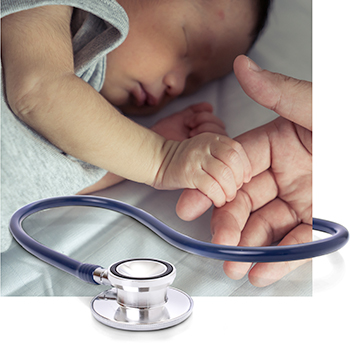
Babies who are born prematurely (“preemies”) are at greater risk for long-term health problems, including chronic lung disease, developmental delays and cerebral palsy. Because these babies are born early, their organs have not had time to develop fully. Preemies tend to be fragile and require specialized care after birth. Although all the reasons behind premature birth are still unknown, there are certain risk factors that can be eliminated or reduced if pregnant women take certain actions.
Undergo Early Screening
Early screening should begin 10 – 12 weeks after the first day of your last menstrual period. It is critical that all pregnant women be screened early for risk factors that could lead to premature delivery, including:
- Age – Pregnant women under the age of 18 and over the age of 30 are at higher risk for premature delivery, especially if other risk factors are present.
- Presence of infection – Infections, especially vaginal and urinary tract infections, can increase the risk of premature birth.
- Medical history of prematurity – A woman who has had one premature baby is at high risk for another.
- Multiple fetuses – Twins or more put a woman at greater risk for delivering early.
- Diabetes – Women who had type 1 or type 2 diabetes before pregnancy are more likely to deliver early. Ideally, these women should see their obstetrician prior to becoming pregnant to ensure proper glucose control prior to conception. Poor glucose control at time of conception increases the risk of birth defects to 20%.
- High blood pressure – Women who have high blood pressure at conception are more at risk for premature delivery.
- Blood diseases and disorders – Blood tests can check for immunities to certain diseases, anemia and certain blood disorders that all can increase the risk of premature delivery.
- Cervical incompetence – Doctors should screen for situations that would put you at risk for premature dilation of the cervix, which leads to early delivery.
- Prior surgeries on your uterus – Doctors should be informed of prior surgeries and, if possible, be given copies of the operative reports to evaluate whether you are in a high risk category.
Follow Your Doctor’s Orders
If you have one or more of the risk factors listed above, it’s important to follow your doctor’s instructions and make all of your scheduled appointments.
Stop Smoking
Smoking has been directly related to low-weight babies, even if they are full term.
Avoid Alcohol
No amount of alcohol is safe for a pregnant woman.
Eat Nutritiously
Fetuses get their nutrition from the mother. A diet high in lean protein, fruits and vegetables will help control weight gain, as well.
Exercise Self-care
Pregnant women should avoid unnecessary emotional or physical stress, and should leave an abusive relationship.
Alert Your Obstetrician to Problems
Any unusual bleeding or pain should be reported immediately to your doctor. If bleeding or pain occurs in the third trimester, it could indicate a dangerous condition of the uterus or cervix.
Educate Yourself
A woman may not be able to control all the risk factors of premature birth, but she can do her part. For information about the most common mistakes doctors and hospitals make that can lead to birth injuries, read “Common Mistakes Leading to Brain Injury in Newborns.”
